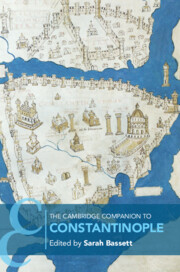Book contents
- The Cambridge Companion to Constantinople
- The Cambridge Companion to Constantinople
- Copyright page
- Dedication
- Contents
- Figures
- Notes on Contributors
- Acknowledgments
- Abbreviations
- Introduction
- Part I The Place and Its People
- Part II Practical Matters
- 4: Waters for a Capital: Hydraulic Infrastructure and Use in Byzantine Constantinople
- 5: The Supply of Food to Constantinople
- 6: Constantinople: Building and Maintenance
- 7: The Defence of Constantinople
- Part III Urban Experiences
- Part IV Institutions and Activities
- Part V Encountering Constantinople
- Bibliography
- Index
- Cambridge Companions to the Ancient World
- References
4: - Waters for a Capital: Hydraulic Infrastructure and Use in Byzantine Constantinople
from Part II - Practical Matters
Published online by Cambridge University Press: 17 March 2022
- The Cambridge Companion to Constantinople
- The Cambridge Companion to Constantinople
- Copyright page
- Dedication
- Contents
- Figures
- Notes on Contributors
- Acknowledgments
- Abbreviations
- Introduction
- Part I The Place and Its People
- Part II Practical Matters
- 4: Waters for a Capital: Hydraulic Infrastructure and Use in Byzantine Constantinople
- 5: The Supply of Food to Constantinople
- 6: Constantinople: Building and Maintenance
- 7: The Defence of Constantinople
- Part III Urban Experiences
- Part IV Institutions and Activities
- Part V Encountering Constantinople
- Bibliography
- Index
- Cambridge Companions to the Ancient World
- References
Summary
Chapter 4, “Waters for the Capital: Hydraulic Infrastructure and Use in Byzantine Constantinople,” provides an overview of the history of water supply and distribution to Constantinople, discussing the construction and maintenance of hydraulic infrastructure and its importance in determining the ways in which the city grew and developed.
- Type
- Chapter
- Information
- The Cambridge Companion to Constantinople , pp. 67 - 86Publisher: Cambridge University PressPrint publication year: 2022

